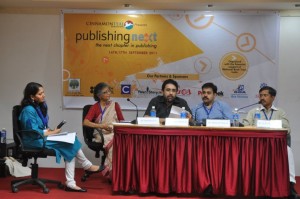by Vinutha Mallya
Going to Goa for a conference? No one around me could hide the tone of incredulity in their question, when I was invited as a speaker for Publishing Next 2011. I was thrilled at being able to go to Goa, where my ancestors hailed from, for something other than pilgrimage and the beaches.
That Goa is much more than beach destinations is often overlooked by merrymakers and bohemian drifters. For its native residents, it is home, encrusted in history, tradition and everyday life. The thought of going there for something purposeful, meaningful even, was a first, and therefore, very appealing. The theme of the conference was “The Future of Publishing”. I was chairing the session on Copyright Law.

It was pouring rain when I landed at Dabolim airport that evening in September 2011. Since three of us were landing from different cities at about the same time, a car and two volunteers were waiting to take us to the venue, the International Centre Goa in Dona Paula. The meet-greet by the young volunteers was our first glimpse of the wonderful hospitality that awaited us over the next two days.
The roster of speakers at the conference included the who’s-who in Indian publishing industry and literary world—some popular, and others who have been silent revolutionaries. What made the list interesting was not just this group. It was the variety of speakers and audience that had come together, which made the conference a valuable and memorable experience. Voices from across the spectrum spoke: traditional–non-traditional, Indian languages–English, government-private, author–editor, writer–translator, offline–online, copyright–copyleft, print–digital, bookseller–reader–reviewer, etc.
Over the next two days, the sessions revealed that before looking at the “future of publishing” there was a lot of the present to deal with. During the conference it was obvious that the publishing ecosystem in India has suffered from a lack of dialogue and exchange of views. Very few platforms exist for this. The Jaipur Literature Festival and its offshoots have created a glamorous profile of the Indian literary scene, but the industry professionals rarely get a stage. Publishing Next is one among a handful that has aimed to do this, and perhaps the only one such in the southern part of the country.
The challenge for Publishing Next 2011 was to bring together a seemingly motley group into a coherent discussion; while also to expand the scope of “publishing” by including the many directions in which technology was pulling it.
Not too long after the first session began, it was clear that “digital” was no longer the elephant in the room. Ebooks, digital publishing, self-publishing and social media held collective interest among publishers. Authors, bloggers and newbie publishers iterated that the world was more “social” and everything was changing. A workshop that gave an introduction to creating twitter and facebook accounts and their relative benefits, also gave useful tips.
Panel discussions on policy and law, independent publishing, the importance of translations, and the challenges in distribution and selling, were taken up in the course of the two days. The conference had received support from the National Book Trust and the British Council.
Winners of the British Council’s Young Creative Entrepreneur award for publishing, from Indian and the UK, presented the winning projects.
Along with the panel discussions, interaction between speakers and participants was very engaging. We had plenty of opportunity to carry forth the discussion over breakfast, tea-breaks and meals. Many of us came away with new contacts and friends. It is to the credit of the organising team and the young volunteers that although it was their first time, the conference proceeded smoothly, and without a hitch.
To my mind, Publishing Next has the potential to become a permanent entry in India’s publishing calendar, as a platform for the future of our publishing industry. It cannot get there without vision and support from the industry.
When I left after the conference, I hadn’t thought that a year would go by so quickly. Although we didn’t come away with clear answers to determine the future of publishing, we left with more direction. We might get closer to the future this year—the line-up for Publishing Next 2012 looks very promising.
Quotable quotes from Publishing Next 2011:
“Digital Books are headed almost everywhere”– Kailash Balani, President of the Federation of Publishers and Booksellers Associations in India (FPBAI) and MD of Aditya Books.
“We need to build on what we’ve learned”. – Radhika Menon, Publisher of Tulika Books.
“Although it was very tempting to mush together new media, new technology for its own sake does not enhance writing.” – James Bridle, Director of Bookkake and finalist of UK YCE Publishing Award 2009.
“Collaboration is a survival strategy” – Mandira Sen, Publisher of Stree and Samya imprints, and founding member of IPDA.
Vinutha Mallya is an independent publishing consultant and an advisor to Publishing Next